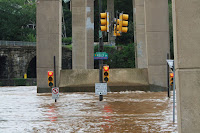News of the short-term climate catastrophe scientists say the world now faces first came over the weekend of October 6-7. That’s just as many across the U.S. were already consumed by “breaking news” of an entirely different sort – the confirmation of a new Supreme Court justice, Brett Kavanaugh.
...
Major broadcast networks and cable news stations, and what remains of serious daily newspapers soon were giving earnest play to the latest IPCC report, and expressing substantial levels of concern.
For those who somehow missed it, a quick catch-up: The news from IPCC scientists gathered from across the world was indeed serious, and troubling to all but those wanting to still play the “hoax” card. A few samplings from the report:
- “Limiting global warming to 1.5 degrees C would require rapid, far-reaching and unprecedented changes in all aspects of society.”
- Limiting the warming to 1.5 rather than to 2 degrees C will provide “clear benefits to people and natural ecosystems…, ensuring a more sustainable and equitable society.” That is, there’s a big difference in that one-half degree C in terms of adverse impacts.
- “We are already seeing the consequences of 1-degree C of global warming through more extreme weather, rising sea levels, and diminishing arctic sea ice, among other changes.”
- “By 2100, global sea-level rise would be 10 cm [nearly four inches] lower with global warming of 1.5 C compared with 2 C.”
- “Likelihood of an Arctic Ocean free of sea ice in summer would be once per century with global warming of 1.5 C, compared with at least once per decade with 2 C.”
- “Coral reefs would decline by 70-90 percent with global warming of 1.5 C whereas virtually all (>99 percent) would be lost with 2C.”
Gulp.
It’s that very important distinction – between the stated goal of limiting warming to no more than 2 degrees C and the “aspirational” goal of capping warmth at 1.5 degrees C – that strikes many as a particularly valuable contribution of the new report. It ends up there’s a B I G difference indeed in term of the severity of impacts between 1.5 and 2 degrees C.
But there’s more too.
Achieving that 1.5-degree C maximum warming threshold means “rapid and far-reaching transitions in land, energy, industry, buildings, transport, and cities,” with global net human-caused emissions of CO2 falling by roughly 45 percent from 2010 levels by 2030 … to “net zero” around 2050.
Read more at 'Dire' IPCC Report Ignites Headlines, Media Coverage

No comments:
Post a Comment